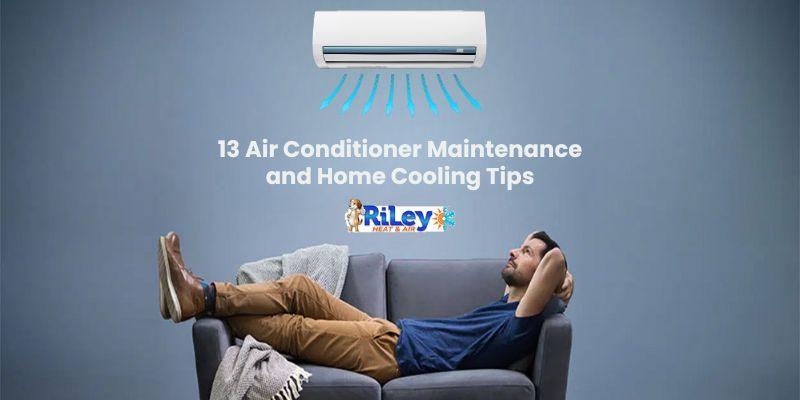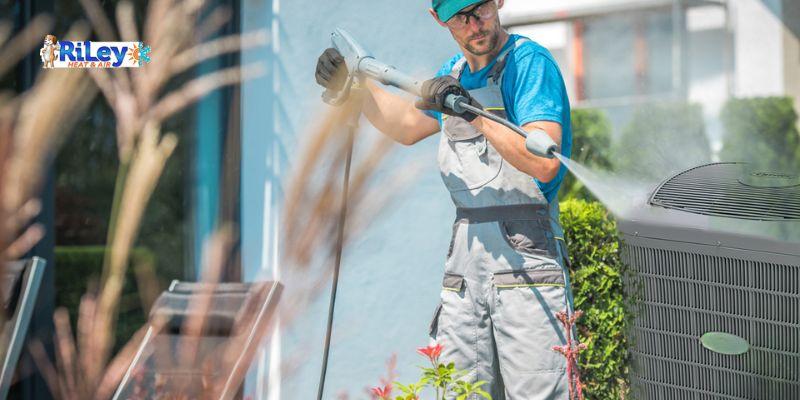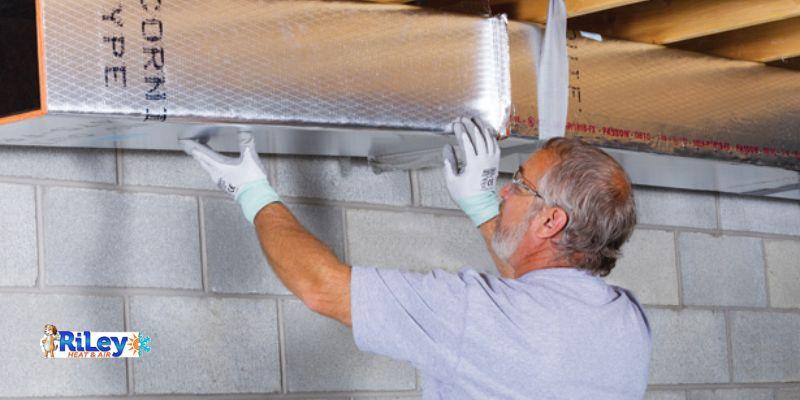
13 Air Conditioner Maintenance and Home Cooling Tips
Keeping your home cool and comfortable becomes a top priority as the scorching summer sun approaches. Your trusty air conditioner is crucial in maintaining a refreshing indoor environment. However, like any other appliance, it requires regular maintenance.
With a few simple steps, you can ensure your AC keeps you cool throughout the season while prolonging its lifespan and saving on energy bills. Here are 13 air conditioner maintenance and home cooling tips to help you beat the heat and stay comfortable all summer.
13 Air Conditioner Maintenance and Home Cooling Tips
Clean or Replace Air Filters Regularly
The air filters in your air conditioner play a vital role in maintaining indoor air quality and ensuring proper airflow. Over time, these filters can become clogged with dust, pollen, and other debris, reducing the efficiency of your AC system. To prevent this, make it a habit to clean or replace your air filters every one to three months, depending on usage. Clean filters improve indoor air quality and help your AC run more efficiently, saving energy and reducing wear and tear on the system.
Keep the Outdoor Unit Clean and Clear

Your air conditioner's outdoor unit, or the condenser unit, is exposed to the elements year-round. Leaves, dirt, and debris can accumulate around the unit, obstructing airflow and reducing efficiency. To ensure optimal performance, regularly inspect the outdoor unit and remove any debris that may have accumulated around it. Trim any vegetation or bushes near the unit to maintain airflow and prevent obstruction.
Schedule Annual Maintenance
Like your car, your air conditioner requires regular tune-ups to run smoothly. Schedule an annual maintenance service with a qualified HVAC contractor in Washington, D.C, to inspect and tune up your AC system before the start of the cooling season. During this service, the air conditioning repair personnel will check for issues, clean the coils, lubricate moving parts, and ensure your system is operating efficiently. Annual maintenance not only extends the lifespan of your air conditioner but also helps identify and address potential problems before they escalate into costly repairs.
Install a Programmable Thermostat
A programmable thermostat allows you to set different temperature settings for different times of the day, ensuring optimal comfort and energy savings. You can significantly reduce energy consumption and lower your utility bills by programming your thermostat to adjust the temperature automatically when you are away or asleep. Additionally, some smart thermostats offer advanced features such as remote access and energy usage tracking, giving you greater control over your home's cooling system.
Seal and Insulate Your Home
Proper insulation and sealing are essential for maintaining a comfortable indoor environment and maximizing energy efficiency. Inspect your home for drafts around windows, doors, and other openings, and seal any gaps or cracks with weatherstripping or caulking. Additionally, ensure that your home is adequately insulated, especially in the attic and walls, to prevent heat transfer and keep cool air indoors. By improving insulation and sealing, you can reduce the workload on your air conditioner and lower your energy bills.
Use Ceiling Fans and Ventilation
Ceiling fans are a cost-effective way to enhance the cooling efficiency of your air conditioner and improve air circulation throughout your home. During the summer, set your ceiling fans to run counterclockwise to create a downdraft that helps distribute cool air more effectively. Additionally, use exhaust fans in the kitchen and bathrooms to remove heat and humidity, reducing the workload on your air conditioner. Combining ceiling fans and ventilation allows you to maintain a comfortable indoor environment while minimizing energy consumption.
Consider Alternative Cooling Methods
In addition to your air conditioner, consider alternative cooling methods to keep your home comfortable during summer. Portable fans, window air conditioners, and evaporative coolers are all effective options for cooling specific areas of your home without relying solely on your central AC system. Additionally, strategic use of shading devices such as blinds, curtains, and awnings can help block out the sun's heat and reduce the need for artificial cooling. By incorporating these alternative cooling methods, you can reduce your reliance on your air conditioner and lower your energy bills while staying comfortable in the summer heat.
Check and Seal the Ductwork

Leaky ductwork can result in significant energy loss and reduced cooling efficiency. Inspect your ductwork for any signs of leaks, such as loose connections or visible gaps, and seal them with duct sealant or metal tape. Properly sealed ductwork helps prevent cooled air from escaping and ensures it reaches its intended destination, keeping your home comfortable and your energy bills low.
Shade Your Outdoor Unit
Direct sunlight can cause your air conditioner's outdoor unit to work harder and less efficiently. Provide shade for the outdoor unit by planting shrubs or trees nearby or installing a shade canopy. By reducing the amount of direct sunlight hitting the unit, you can help it operate more efficiently and prolong its lifespan.
Maintain Proper Ventilation
Good ventilation is essential for maintaining indoor air quality and preventing moisture buildup, which can lead to mold and mildew growth. Ensure that vents and registers are not blocked by furniture or other obstructions, allowing air to flow freely throughout your home. Additionally, consider installing attic vents or a whole-house ventilation system to remove stale air and improve air circulation.
Inspect and Clean Evaporator Coils
Over time, dirt and debris can accumulate on the evaporator coils, reducing their ability to absorb heat and cool the air effectively. Inspect the coils regularly using a soft brush or vacuum cleaner. Avoid harsh chemicals or abrasive materials, as these can damage the coils. Keeping the evaporator coils clean helps maintain proper airflow and ensures the efficient operation of your air conditioner.
Monitor Refrigerant Levels
Refrigerant is a substance that absorbs heat from the indoor air and transfers it outside to be dispersed. Low refrigerant levels can result in reduced cooling capacity and increased energy consumption. Schedule regular inspections with an experienced air conditioning service team to check refrigerant levels and top off if necessary. Additionally, look for signs of refrigerant leaks, such as ice buildup on the refrigerant lines or reduced cooling performance, and address them promptly to prevent further damage to your system.
Use Energy-Efficient Cooling Settings
Optimize your air conditioner's settings for maximum energy efficiency and comfort. Set the thermostat to the highest temperature comfortable for you and your family, typically around 78°F (25°C), and use fans to help circulate cool air. Additionally, take advantage of energy-saving features such as "auto" mode, which allows the fan to operate only when cooling is needed, and "sleep" mode, which gradually increases the temperature overnight to save energy while you sleep.
Conclusion
Keeping your home cool and comfortable during the summer can be manageable. By following these seven air conditioner maintenance and home cooling tips, you can ensure optimal performance from your AC system while saving energy and money. From regular filter changes to annual maintenance and smart thermostat installation, simple steps can go a long way toward maximizing comfort and efficiency. So, beat the heat this summer with a well-maintained air conditioner and a few smart cooling strategies.







COMMENTS